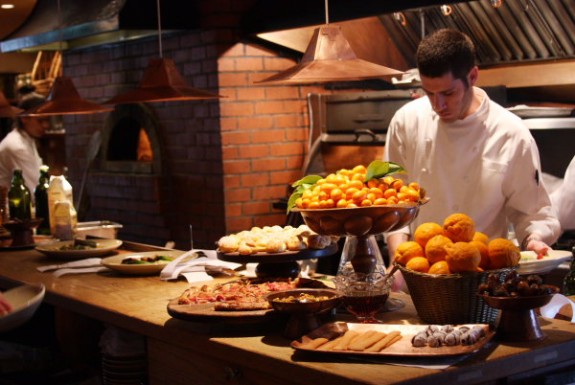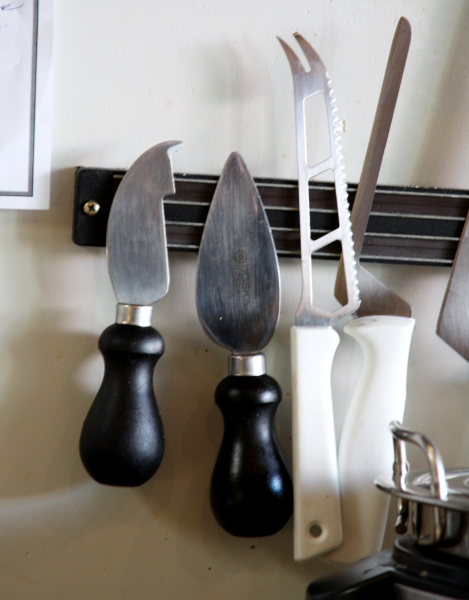
Eating at a great restaurant is like encountering sirens at sea: though thoroughly beguiling, a magnificent dining experience can make you do foolish things. Legions of enthusiastic food lovers have crashed their budget on the rocks with an impossibly expensive bottle of esoteric wine or overspent on a tasting menu they couldn’t afford. Bewitching cooking methods have influenced kitchen renovations, spurred the rise in molecular gastronomy tool kits for amateurs and inflated the enrollment rates at culinary schools. Though risky, these are but mere dalliances with danger when compared to overnight restaurant openings and food truck roll outs.
The siren song of flawless service and impeccable food can lull the smartest of men and reasonable of women into a dream state where restaurant ownership seems like a good and easy choice. A well-run restaurant has the power to hypnotize mere mortals and make them empty their bank account and mortgage their home for the promise of serving their three favorite dishes in a well-designed dining room.
Listen to me very carefully. Resist the temptation. Ignore the symphony of wouldn’t it be wonderful and at my restaurant we’d do things like this, only better.
It takes a very special person—the kind of person who loves the roller coaster rush of not knowing what’s going to happen next, enjoys making very little money, loves people, is calm under pressure, thrives in chaos, thinks a twelve-hour workday six days a week is reasonable, and feels more comfortable taking care of others than themselves—to survive the life of a restaurant owner. You’ll have to do plenty of unexpected things–things like plunge a toilet, shop for vegetables at midnight, wash dishes in an expensive suit, bus tables, dust chandeliers at 2 in the morning, eat scraps from a cold plate of food because that’s all you have time for, and so many other things that will shock you. Someone will no show for work, something will break, customers will be disappointed (even if you’re doing a great job), and there will always be some kind of a personality conflict occurring—no matter how hard you try–somewhere between the front door of the dining room and the employee exit out the back of the kitchen.
Perhaps the siren song of restaurant ownership has made you fearless. Understood. Influential restaurants and great dining experiences can carry a powerful tune. But before you swim towards the cliffs of restaurant ownership, I suggest you follow this simple six-step plan to determine your fortitude as an owner/operator.
Step one—Thursday Dinner party
Organize and throw a large dinner party for your friends and family. Invite twenty people. Cook everything if you can. Have someone help you if you must. If that doesn’t break you, then clean up, go shopping, and get ready for step two.
Step two—Friday Dinner party
Invite twenty-five people over for dinner the next night. Go shopping. Prep the dishes. Cook. Serve the food. Make sure everyone eats at the same time and doesn’t have to wait too long between courses. Clean up. Get sleep. Get ready for step three.
Step three—Saturday Night Dinner Party
The next day, invite 25 people to come over for a dinner party. Tell a few of those people they’re more than welcome to bring a friend, just to see how you do if more people than expected show up. Go shopping. Prep. Cook. Serve. When serving, let your dinner party guests that you are happy to allow simple modifications to your menu like sauce on the side kinds of stuff. See how that goes for you. Clean up. Get some sleep. Get ready for step four.
Step four—Sunday Brunch
Wake up early on Sunday, go shopping and cook a large brunch for twenty of your closest friends. Serve fresh juice, coffee, tea, and mimosas. Make sure no one’s glass goes empty for long. Clean up. Ask for feedback from you guests. Get some sleep. Get ready for step five.
Step Five—Return to your regular job on Monday
You can not call in sick or come in late. Begin planning for another dinner party weekend. This time plan for starting on Wednesday.
Step Six—Repeat steps one through five.
If you can make through one full rotation of this cycle without losing a close friendship, your job, sanity, or love for making and serving food, then I think there may be a chance you could have what it takes to run and own a restaurant.
Passing this test doesn’t mean you’ll be successful as a restaurant owner. It proves you have the fortitude to make it through half a week of running a small restaurant. There’s a cavern of difference between restaurant owners and successful restaurateurs. Most restaurateurs make very little money (think pennies on every dollar). Most new restaurants shut down within the first twelve months or lose money after several years. Even though restaurants are one of the largest private-sector businesses in America, the food service industry is one of the least profitable trades around.
Successful restaurants make the dangerous stuff look easy. To be in the food service industry you must face a beautiful war of food and service. The only way to succeed is to love the fight and enjoy swimming against an unending tide of challenges. If you do, you’re in for a wonderful and difficult journey.
- Service 101: Finding My Religion
- Service 101: A Brief History of Tipping
- Service 101: When Gratuity IS Included
- Service 101: Service NOT Included
- Service 101: Why Servers Don’t Get Any Respect
- Service 101: Restaurants Are Not Picnic Tables
- Service 101: Waiting Tables is An Honorable Profession
- Service 101: Why You Shouldn’t Eat Out on Valentine’s Day
- Service 101: Why Diners Need Restaurant Critics
- Service 101: Just Because You’ve Traveled Doesn’t Mean You Are a Restaurant Expert



Owning your own restaurant is a lot of work. I am tired after reading your post. I am glad some people have the passion and dedication because when someone gets it right, it is a pleasure to dine out and experience that passion on a plate.
I have to give props where props are due, far to often I hear tales of people longing to get into the food industry with no knowledge of the industry.
I am all for chasing your dreams and what not, but I wish more people understood just what is involved in this potential selling of one’s soul
Great article
@Gabriel Hummel,
Restaurants are a tough business. Too many people think of them as a simple industry and don’t see all the hard work going on behind the scenes.
Thanks for taking the time to swing by!
Maybe on week two recommend that they throw the same dinner parties, but tell people to show up at any time they feel like between 6pm and midnight, and start feeding them their first course within 20 minutes of arrival…. Oh, and just 12 hours a day, six days a week? That sounds like one heck of a cushy restaurant owner’s job. Hell, that’d be cushy for most chefs and/or managers.
Great post – glad I found your blog. It’s always difficult working out how to give ‘dreamers’ an idea about the relentless of restaurant life – your 4 day bootcamp would come fairly close!
Keep up the good work – Ken
Fantastic post. I’ve worked exactly one day in a restaurant, and despite the fact that I fantasize about owning my own food-related business, I realize I’m not cut out for restaurant work.
I’m keeping the food truck and casserole delivery service dreams, though.
Lol. You nailed it! You need to come up with an FOH boot camp next!
You forgot your cook deciding Aunt Molly died (again) and s/he need the night off. Or Princess has a date and it’s Friday and she’s on the schedule. But best of all, the part where the bank account you had which has all those digits in the balance finally get down to a managable few.
You nailed it! Everyone thinks!!!!! they want our headaches! However, “you can take the boy/girl out of the restaurant but you cannot take the restaurant out of the boy/girl!”
Funny & though-provoking! Everytime I get the urge, I’ll re-read this article. Looking forward to more of your tweets. 🙂
Thanks.
I did Step 3 and 4 once. After that, I quit my job and went to Nepal for 3 weeks 😉
Carrie,
That’s funny! I wish I could go to Nepal for three weeks after a hard week at the restaurant. I’ll mention that to my boss. 🙂
This post was emailed to me by my fiance, I routinely annoy him with my “when we open our restaurant” comments. Reality Check!!!! Maybe cooking for 2 is what I am meant to do.
everyone will tell you that owning and running a restaurant is hectic, my main advice is to use productivity tools that give you more of that most valuable commodity…time.
Key areas include:
– Finding new customers and keeping existing business / Marketing
– Food Logistics
– Staff Management
– Table/booking management & billing
– Financial reporting, Accounts payable and Accounting.
If you are like me, being gen Y or X, then you’ll be sweet with leveraging internet tools as a way to promote and run your business – i’ve found working with older restaurant owners that they are less likely to be adopters of technology, but this doesn’t help in a competitive and financially challenging environment.
For me the most time consuming area has been food logistics and staff management, you really need a hands on approach for this. For marketing, tables/booking management and the financial area I use web and iphone applications.
The most useful tool for me which has been a godsend is yumtable.com – a last minute restaurant booking service, essentially allows you to post tables and deals online where you have quiet time periods, eg Mon/Tuesday evenings or for last minute cancellations. But because you can tailor your own offers at any time period for any number of tables, i’ve also used it for specials as well, eg I got a good deal on snapper and offered 5 tables a night for a special sitting at 5pm with a movie ticket with a snapper main. It’s great fun and new and old customers have used it – Offers are also automatically posted to your facebook and twitter accounts 2 hours before they expire – which leverages the social network of my cafe. I also get bookings from text messages so it’s very efficient and with no equipment costs and it’s free to use for the first 20 bookings to see if it works.
opentable.com has also been handy but I find that most of my customers have bookmarked my phone number to call for a booking rather than bothering online.
For accounting I’m using xero.com, it’s an amazing tool that literally takes your purchases from your bank feeds and after you teach it, will remember what transaction should go to what account – this is truly a huuuuge time saver. Being online, at any point i can log in and see the status of my business and it’s health – without minimal need for a bookkeeper. Costs around $50 a month but worth it for you not having to think about your accounts, whenever i log in it’s all there without the need to spend early hours of the morning entering in receipts, etc.
The last tool i’ve found useful is billstrust.com – this nifty online business is awesome for businesses that get lots of bills from lots of sources – you can simply grab any bill including hand written ones and fax/email or take a pic with your camera phone and email it – and this service will handle data entry and queue up the bill for payment by the due date – you can view at any one time your liabilities due over coming months. I get stacks of supplier bills as well as your standard electricity/gas bills so all my bills are in one place – and i can sync it with my xero account to have a real time picture of where my business is at – again this saves on the need for a bookkeeper.
The only thing i’d like to be easier is payroll management, but i’m looking into solutions at the moment for that.
Amen, Brooke. AMEN.
Ahh, so true!! Had to wash dishes in suit, bus, and buy groceries at midnight.
It’s not easy at all, but so worth it, if you truly enjoy it! Good article.
Thanks, Alex! I appreciate you coming by, reading, and adding your professional experience!
after reading this article i think i better try something else because evething is the opposite of me i don’t think i thrive well in chaos and i work with a manager who get miserable often noe i realize is the pressure. i love food though